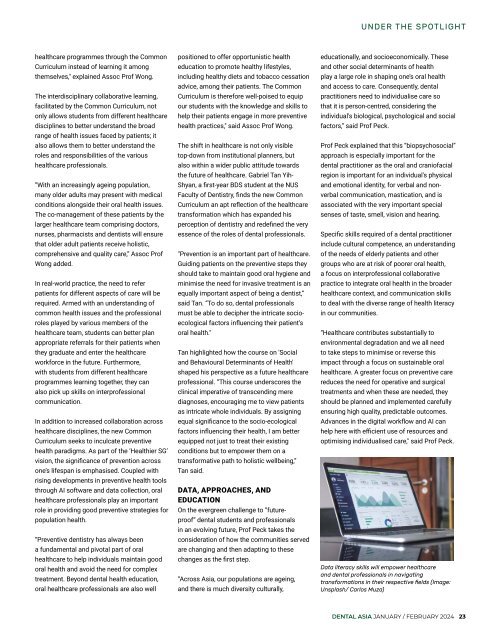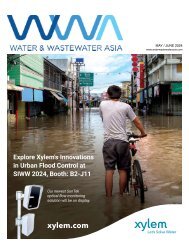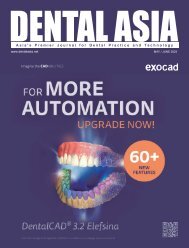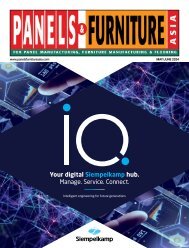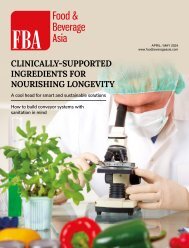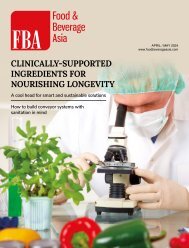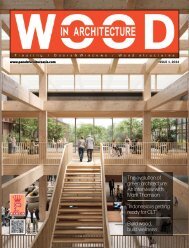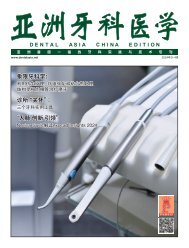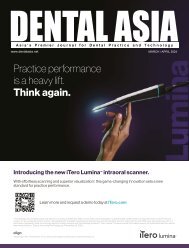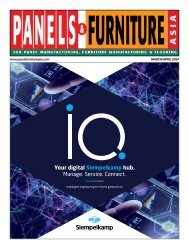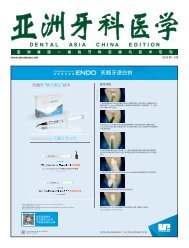Dental Asia January/February 2024
For more than two decades, Dental Asia is the premium journal in linking dental innovators and manufacturers to its rightful audience. We devote ourselves in showcasing the latest dental technology and share evidence-based clinical philosophies to serve as an educational platform to dental professionals. Our combined portfolio of print and digital media also allows us to reach a wider market and secure our position as the leading dental media in the Asia Pacific region while facilitating global interactions among our readers.
For more than two decades, Dental Asia is the premium journal in linking dental innovators and manufacturers to its rightful audience. We devote ourselves in showcasing the latest dental technology and share evidence-based clinical philosophies to serve as an educational platform to dental professionals. Our combined portfolio of print and digital media also allows us to reach a wider market and secure our position as the leading dental media in the Asia Pacific region while facilitating global interactions among our readers.
You also want an ePaper? Increase the reach of your titles
YUMPU automatically turns print PDFs into web optimized ePapers that Google loves.
UNDER THE SPOTLIGHT<br />
healthcare programmes through the Common<br />
Curriculum instead of learning it among<br />
themselves," explained Assoc Prof Wong.<br />
The interdisciplinary collaborative learning,<br />
facilitated by the Common Curriculum, not<br />
only allows students from different healthcare<br />
disciplines to better understand the broad<br />
range of health issues faced by patients; it<br />
also allows them to better understand the<br />
roles and responsibilities of the various<br />
healthcare professionals.<br />
“With an increasingly ageing population,<br />
many older adults may present with medical<br />
conditions alongside their oral health issues.<br />
The co-management of these patients by the<br />
larger healthcare team comprising doctors,<br />
nurses, pharmacists and dentists will ensure<br />
that older adult patients receive holistic,<br />
comprehensive and quality care,” Assoc Prof<br />
Wong added.<br />
In real-world practice, the need to refer<br />
patients for different aspects of care will be<br />
required. Armed with an understanding of<br />
common health issues and the professional<br />
roles played by various members of the<br />
healthcare team, students can better plan<br />
appropriate referrals for their patients when<br />
they graduate and enter the healthcare<br />
workforce in the future. Furthermore,<br />
with students from different healthcare<br />
programmes learning together, they can<br />
also pick up skills on interprofessional<br />
communication.<br />
In addition to increased collaboration across<br />
healthcare disciplines, the new Common<br />
Curriculum seeks to inculcate preventive<br />
health paradigms. As part of the ‘Healthier SG’<br />
vision, the significance of prevention across<br />
one’s lifespan is emphasised. Coupled with<br />
rising developments in preventive health tools<br />
through AI software and data collection, oral<br />
healthcare professionals play an important<br />
role in providing good preventive strategies for<br />
population health.<br />
“Preventive dentistry has always been<br />
a fundamental and pivotal part of oral<br />
healthcare to help individuals maintain good<br />
oral health and avoid the need for complex<br />
treatment. Beyond dental health education,<br />
oral healthcare professionals are also well<br />
positioned to offer opportunistic health<br />
education to promote healthy lifestyles,<br />
including healthy diets and tobacco cessation<br />
advice, among their patients. The Common<br />
Curriculum is therefore well-poised to equip<br />
our students with the knowledge and skills to<br />
help their patients engage in more preventive<br />
health practices," said Assoc Prof Wong.<br />
The shift in healthcare is not only visible<br />
top-down from institutional planners, but<br />
also within a wider public attitude towards<br />
the future of healthcare. Gabriel Tan Yih-<br />
Shyan, a first-year BDS student at the NUS<br />
Faculty of Dentistry, finds the new Common<br />
Curriculum an apt reflection of the healthcare<br />
transformation which has expanded his<br />
perception of dentistry and redefined the very<br />
essence of the roles of dental professionals.<br />
"Prevention is an important part of healthcare.<br />
Guiding patients on the preventive steps they<br />
should take to maintain good oral hygiene and<br />
minimise the need for invasive treatment is an<br />
equally important aspect of being a dentist,”<br />
said Tan. “To do so, dental professionals<br />
must be able to decipher the intricate socioecological<br />
factors influencing their patient’s<br />
oral health."<br />
Tan highlighted how the course on 'Social<br />
and Behavioural Determinants of Health'<br />
shaped his perspective as a future healthcare<br />
professional. “This course underscores the<br />
clinical imperative of transcending mere<br />
diagnoses, encouraging me to view patients<br />
as intricate whole individuals. By assigning<br />
equal significance to the socio-ecological<br />
factors influencing their health, I am better<br />
equipped not just to treat their existing<br />
conditions but to empower them on a<br />
transformative path to holistic wellbeing,”<br />
Tan said.<br />
DATA, APPROACHES, AND<br />
EDUCATION<br />
On the evergreen challenge to “futureproof”<br />
dental students and professionals<br />
in an evolving future, Prof Peck takes the<br />
consideration of how the communities served<br />
are changing and then adapting to these<br />
changes as the first step.<br />
“Across <strong>Asia</strong>, our populations are ageing,<br />
and there is much diversity culturally,<br />
educationally, and socioeconomically. These<br />
and other social determinants of health<br />
play a large role in shaping one’s oral health<br />
and access to care. Consequently, dental<br />
practitioners need to individualise care so<br />
that it is person-centred, considering the<br />
individual's biological, psychological and social<br />
factors,” said Prof Peck.<br />
Prof Peck explained that this “biopsychosocial”<br />
approach is especially important for the<br />
dental practitioner as the oral and craniofacial<br />
region is important for an individual's physical<br />
and emotional identity, for verbal and nonverbal<br />
communication, mastication, and is<br />
associated with the very important special<br />
senses of taste, smell, vision and hearing.<br />
Specific skills required of a dental practitioner<br />
include cultural competence, an understanding<br />
of the needs of elderly patients and other<br />
groups who are at risk of poorer oral health,<br />
a focus on interprofessional collaborative<br />
practice to integrate oral health in the broader<br />
healthcare context, and communication skills<br />
to deal with the diverse range of health literacy<br />
in our communities.<br />
“Healthcare contributes substantially to<br />
environmental degradation and we all need<br />
to take steps to minimise or reverse this<br />
impact through a focus on sustainable oral<br />
healthcare. A greater focus on preventive care<br />
reduces the need for operative and surgical<br />
treatments and when these are needed, they<br />
should be planned and implemented carefully<br />
ensuring high quality, predictable outcomes.<br />
Advances in the digital workflow and AI can<br />
help here with efficient use of resources and<br />
optimising individualised care," said Prof Peck.<br />
Data literacy skills will empower healthcare<br />
and dental professionals in navigating<br />
transformations in their respective fields (Image:<br />
Unsplash/ Carlos Muza)<br />
DENTAL ASIA JANUARY / FEBRUARY <strong>2024</strong> 23


